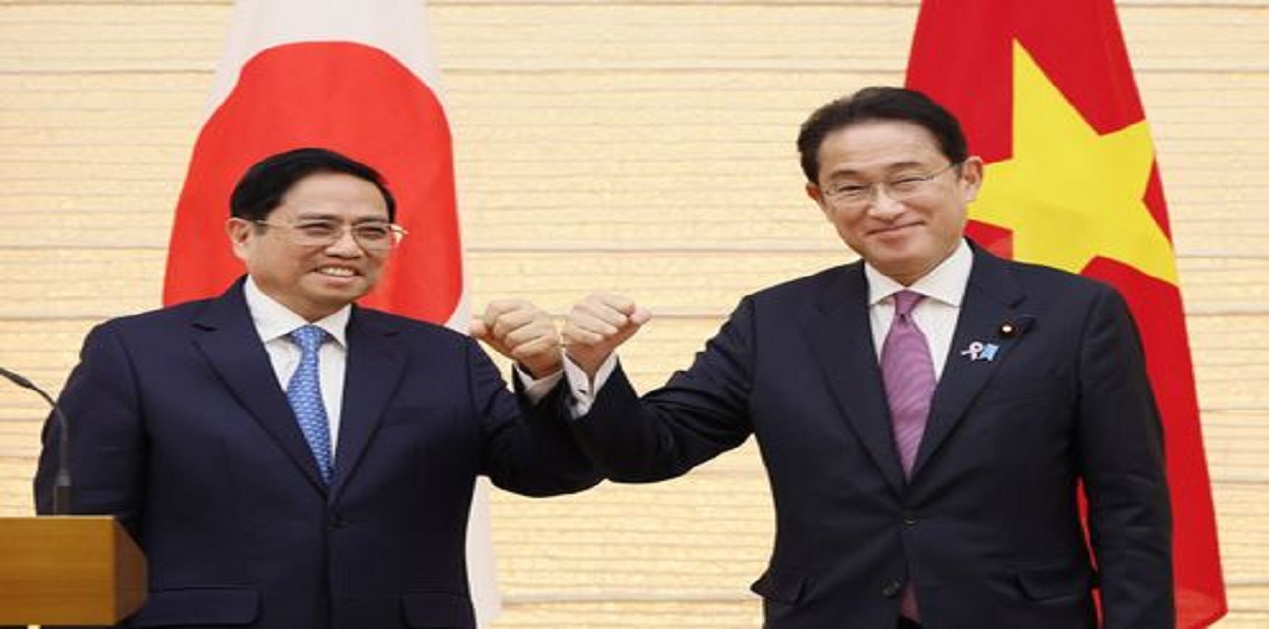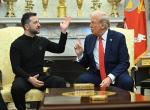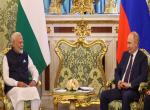The Vietnamese Prime Minister Pham Minh Chinh paid a 4-day official visit from 22 to 25 November to Japan to have discussion with his Japanese counterpart Fumio Kishida on furthering economic and security cooperation between Japan and Vietnam. Chinh was the first foreign leader to be invited to Japan since the Kishida administration came to power on 4 October 2021.
There is a strong synergy between the two countries. Both sides are committed to enhancing bilateral relationship to the next level and have a common resolve to work towards securing peace, stability, development, and prosperity in the region and beyond. On the economic front, China faces challenges in restoring its manufacturing base, which is hit by the yet-to-be-controlled fully coronavirus pandemic.[1] But, what is more worrying for Vietnam is the challenge it faces on the security front as it has been facing Chinese coercion over the territorial issue in the South China Sea. While Vietnam makes claims on the area falling within its exclusive economic zone as defined by international law of the sea, China makes sovereignty claims on over 90 percent of the oceanic space in this part of the sea. There are other claimants as well on areas within their EEZs and face similar challenges from China. Though Japan does not have direct claims on any part of the South China Sea, it has a dispute with China over the Senkaku Islands. Since Japan is a maritime nation heavily dependent on foreign trade, it is concerned that peace and security prevail in the South China Sea through which trillions of dollars worth of cargo transit daily. Japan and Vietnam, therefore, have a common interest in working together to maintain peace and stability in the region.
No wonder, both Chinh and Kishida “expressed serious concern about the situation in South China Sea” and on any unilateral actions aimed at altering the status quo. The purported mention of aggressive moves in regional waters was a veiled reference to China’s growing assertiveness. [2] It was, therefore, both resolved to work together to sustain free and open sea as tensions escalate in the region amid China’s rise. The synergy between the two sides can be deciphered from Kishida’s opening remarks while speaking with Chinh that “Vietnam is an important partner who holds a key to achieving a free and open Indo-Pacific," a vision aimed at countering China's increasingly assertive territorial claims in the disputed region.[3]
Both the leaders also confirmed a range of partnerships in areas such as COVID-19, infrastructure and climate change. In further commitment to its earlier stance, Japan assured Chinh that Japan shall continue to support the strengthening of Vietnam's maritime law enforcement capabilities by accelerating aid for construction of patrol vessels. [4]
China was not mentioned by name in the joint statement.[5] A statement released by the Japan Foreign Ministry underlined the importance of sustaining peace, security, safety, freedom of navigation and over-flights above the South China Sea, and the peaceful resolution of disputes by following international law. [6] The two leaders agreed on the importance of upholding an international maritime order based on the United Nations Law of the Sea (UNCLOS), while affirming they will work together toward economic recovery from the coronavirus pandemic.
Besides claiming the South China Sea almost entirely, China also makes sovereignty claims over Japanese-controlled Senkaku Islands and therefore justifies its right to defend its sovereignty, security and development interests. Chinese vessels routinely violate Japanese territorial waters near the East China Sea islands, sometimes threatening fishing boats.
Given such challenges, Chinh and Kishida confirmed a range of partnerships in areas like COVID-19, infrastructure and climate change. Japan has agreed to support the strengthening Vietnam's maritime law enforcement capabilities by accelerating aid for the construction of patrol vessels.
Japan and Vietnam also signed a cyber-security agreement. [7] In September, the two countries struck a deal allowing Japan to provide defence equipment and technology to Vietnam. [8] Details of the transfer of specific equipment, possibly naval vessels, are still being discussed. Vietnam is the 11th nation with which Japan has signed a defence equipment and technology transfer deal. This way, Tokyo seeks to support its own struggling defence industry. Kishida had no hesitation to openly say that “Vietnam is an important partner for Japan which will serve as the linchpin in its efforts to realize a free and open Indo-Pacific”. In reply, Chinh expressed satisfaction that the two sides can now elevate bilateral relations to new horizons.[9]
Japan’s Defence Minister Nobuo Kishi met with his Vietnamese counterpart Gen. Phan Van Giang. Both agreed to "strongly oppose" unilateral attempts to change the status quo in regional waters without explicitly naming China. Recognizing to the disruption caused to the supply chains by the coronavirus pandemic, Chinh and Kishida took note of the fact that many Japanese firms have factories in Vietnam or use Vietnamese components in their products, and therefore both agreed to strengthen supply chains across their countries, including through the use of digital technologies and diversifying manufacturing facilities. Kishida promised to improve conditions for Vietnamese technical interns and students in Japan. He also pledged to provide an additional 1.54 million doses of coronavirus vaccine to Vietnam, bringing its total contribution to roughly 5.6 million doses.[10]
Other issues that figured the discussion included regional issues, including North Korea and its missile launches. Both urged Pyongyang to adhere to UN Security Council resolutions banning it from using ballistic and nuclear tests. In Myanmar that came under military rule following a coup in February, Kishida said Japan supports the ASEAN’s efforts to play a mediating role.
In 2023, Japan and Vietnam shall complete 50 years of establishment of diplomatic relations. To commemorate this milestone in their diplomatic journey, both sides recognized the importance of holding projects suitable for their relationship and further promoting friendship, mutual understanding and exchange of peoples between the two countries in various fields.
Chinh also held a dialogue with Japanese investors. He affirmed that the Japan-Vietnam relationship has never been as good as it is now and will even grow better in the future. Economic ties have assumed the multidimensional perspectives through trade, investment, technology transfer and flagship projects where Japan’s ODA has played a critical role. Currently, Japan is the largest ODA donor to Vietnam, with nearly $27 billion accounting for approximately 30 percent of the ODA that Japan has provided for countries worldwide. Japan is among the largest foreign investors in Vietnam, with about 4,800 projects totalling over $65 billion. Japan is also the third biggest tourism market for Vietnam, with about 1 million tourists visiting the Southeast Asian nation. There is enough scope for more number of Japanese tourists choosing Vietnam for their destination. Annual trade turnover between the two countries is over $40 billion. [11] The pledge to deepen security cooperation between Japan and Vietnam would please President Joe Biden when Kishida meets Biden sometime soon.
It may be recalled that Vietnam was Suga’s first choice to visit a foreign country in October 2020 after he became the Prime Minister following Abe’s sudden resignation.[12] Suga’s visit had come after Tokyo had announced a $348 million deal to construct six new coastal patrol vessels for Vietnam’s coastguards. Also, Japan has been strengthening the naval capabilities of other ASEAN nations such as the Philippines to put China’s encroachment in the contentious South China Sea under check.
Viewed differently, one could discern that the three Asian countries – India, Japan and Vietnam – are on the same page on a host of issues. There is a prospect for a meaningful trilateral cooperation between the three Asian nations. Such a trilateral forum could be useful for discussing pressing regional issues so that a solution can be found. Indeed an India-Vietnam-Japan triangle can immensely contribute to peace and stability in the region. In this framework, the role of Vietnam would be invaluable as it could contribute to the strengthening of ASEAN centrality. With ASEAN’s centrality in strong footing, India and Japan should be the fulcrum in enhancing cooperation in maritime security, supply chain, economic recovery affected by the nasty pandemic, sustainable infrastructure development, besides sending a powerful message to China. Deeper cooperation in the security and defence domain between the three countries can be a win-win proposition for all the stakeholders. Such outreach initiative would also contribute to furthering India’s Act East policy.
Following Chinh’s visit to Japan, the Vietnamese Prime Minister is soon to pay a visit to India in the coming months to exchange views on similar issues discussed with Kishida. Currently, dates are being discussed through diplomatic channels. Chinh’s visit to India is likely to take place anytime before March 2022.
Chinh also met representatives from leading economic corporations and universities of Japan that intend to invest in Vietnam. Shionogi Inc is committed to producing vaccines and drugs for Covid-19 treatment. The firm wants to invest in a facility for the production of vaccines and also for medicine research in Vietnam, the first of this kind of the groups in Southeast Asia. Similarly, Hitachi Ltd. is keen to expand its investment in projects on environmental, health care, disaster risk reduction and railways in Vietnam. Such projects shall contribute to Vietnam’s development. Another Japanese company, Sumitomo Corporation, partner of BRG Vietnam, invests in developing urban areas in Vietnam. There is scope for expanding business in areas such as urban development. Development of cultural, sports and medical institutions are other areas that look promising.
Endnotes :
[1]https://www3.nhk.or.jp/nhkworld/en/news/20211123_04/
[2] https://www.theweek.in/wire-updates/international/2021/11/24/fgn58-japan-vietnam-scs.html
[3] “Japan, Vietnam Express Serious Concern about South China Sea”, 24 November 2021,
https://www.newsmax.com/world/asia/japan-vietnam/2021/11/24/id/1046001/ Community
[4] “Japan-Viet Nam Summit Meeting”, 24 November 2021, https://www.mofa.go.jp/s_sa/sea1/vn/page3e_001155.html
[5] “Vietnam, Japan issue joint statement toward opening new era in bilateral extensive strategic partnership”, 24 November 2021, https://en.vietnamplus.vn/pm-meets-with-representatives-of-japanese-firms-universities/216043.vnp
[6] “Japan-Viet Nam Summit Meeting”, 24 November 2021, https://www.mofa.go.jp/s_sa/sea1/vn/page3e_001155.html
[7]https://www.theweek.in/wire-updates/international/2021/11/24/fgn58-japan-vietnam-scs.html
[8] “Japan, Vietnam sign defense transfer deal amid China worries”, 12 September 2021, https://www.asahi.com/ajw/articles/14438787
[9] “Japan, Vietnam look to cyber-defense against China”
24 November 2021, https://www.asahi.com/ajw/articles/14487834
[10] “Japan, Vietnam to boost security cooperation amid ‘serious concern’ over South China Sea”, 24 November 2021, https://www.msn.com/en-xl/news/other/japan-vietnam-to-boost-security-cooperation-amid-serious-concerns-over-south-china-sea/ar-AAR6jwh
[11] “Prime Minister meets with representatives of Japanese firms, universities”, 24 November 2021, https://en.vietnamplus.vn/pm-meets-with-representatives-of-japanese-firms-universities/216043.vnp
[12]See, Rajaram Panda, “Japan-Vietnam Security Matrix in the Indo-Pacific Region”, 19 October 2020, https://www.vifindia.org/article/2020/october/19/japan-vietnam-security-matrix-in-the-indo-pacific-region
(The paper is the author’s individual scholastic articulation. The author certifies that the article/paper is original in content, unpublished and it has not been submitted for publication/web upload elsewhere, and that the facts and figures quoted are duly referenced, as needed, and are believed to be correct). (The paper does not necessarily represent the organisational stance... More >>
Image Source: https://japan.kantei.go.jp/content/000094879.jpg?w=496&s=300000











Post new comment